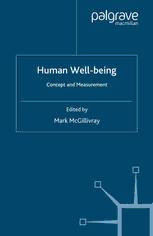
Human Well-Being: Concept and Measurement PDF
Preview Human Well-Being: Concept and Measurement
StudiesinDevelopmentEconomicsandPolicy GeneralEditor:AnthonyShorrocks UNU WORLD INSTITUTE FOR DEVELOPMENT ECONOMICS RESEARCH (UNU- WIDER) was established by the United Nations University as its first research and trainingcentreandstartedworkinHelsinki,Finland,in1985.ThepurposeoftheInsti- tuteistoundertakeappliedresearchandpolicyanalysisonstructuralchangesaffecting the developing and transitional economies; to provide a forum for the advocacy of policies leading to robust, equitable and environmentally sustainable growth; and topromotecapacitystrengtheningandtraininginthefieldofeconomicandsocial policy-making. Its work is carried out by staff researchers and visiting scholars in Helsinkiandthroughnetworksofcollaboratingscholarsandinstitutionsaroundthe world. UNUWorldInstituteforDevelopmentEconomicsResearch(UNU-WIDER) Katajanokanlaituri6B,FIN-00160Helsinki,Finland Titlesinclude: TonyAddisonandAlanRoe(editors) FISCALPOLICYFORDEVELOPMENT Poverty,ReconstructionandGrowth TonyAddison,HenrikHansenandFinnTarp(editors) DEBTRELIEFFORPOORCOUNTRIES GeorgeJ.BorjasandJeffCrisp(editors) POVERTY,INTERNATIONALMIGRATIONANDASYLUM RicardoFfrench-DavisandStephanyGriffith-Jones(editors) FROMCAPITALSURGESTODROUGHT SeekingStabilityforEmergingEconomies DavidFielding(editor) MACROECONOMICPOLICYINTHEFRANCZONE BasudebGuha-Khasnobis(editor) THEWTO,DEVELOPINGCOUNTRIESANDTHEDOHADEVELOPMENTAGENDA ProspectsandChallengesforTrade-ledGrowth BasudebGuha-KhasnobisandRaviKanbur(editors) INFORMALLABOURMARKETSANDDEVELOPMENT AiguoLuandManuelF.Montes(editors) POVERTY,INCOMEDISTRIBUTIONANDWELL-BEINGINASIADURING THETRANSITION MarkMcGillivray(editor) HUMANWELL-BEING ConceptandMeasurement MarkMcGillivray(editor) INEQUALITY,POVERTYANDWELL-BEING RobertJ.McIntyreandBrunoDallago(editors) SMALLANDMEDIUMENTERPRISESINTRANSITIONALECONOMIES VladimirMikhalev(editor) INEQUALITYANDSOCIALSTRUCTUREDURINGTHETRANSITION E.WayneNafzigerandRaimoVäyrynen(editors) THEPREVENTIONOFHUMANITARIANEMERGENCIES MachikoNissankeandErikThorbecke(editors) THEIMPACTOFGLOBALIZATIONONTHEWORLD’SPOOR TransmissionMechanisms MatthewOdedokun(editor) EXTERNALFINANCEFORPRIVATESECTORDEVELOPMENT AppraisalsandIssues LaixiangSun(editor) OWNERSHIPANDGOVERNANCEOFENTERPRISES RecentInnovativeDevelopments UNU-WIDER(editors) WIDERPERSPECTIVESONGLOBALDEVELOPMENT StudiesinDevelopmentEconomicsandPolicy SeriesStandingOrderISBN978-0-333-96424-8 (outsideNorthAmericaonly) Youcanreceivefuturetitlesinthisseriesastheyarepublishedbyplacingastanding order.Pleasecontactyourbookselleror,incaseofdifficulty,writetousattheaddress belowwithyournameandaddress,thetitleoftheseriesandtheISBNquotedabove. CustomerServicesDepartment,MacmillanDistributionLtd,Houndmills,Basingstoke, HampshireRG216XS,England Human Well-being Concept and Measurement Editedby Mark McGillivray in association with PalgraveMacmillan ©UnitedNationsUniversity2007 Softcover reprint of the hardcover 1st edition 2007 978-0-230-00498-6 Allrightsreserved.Noreproduction,copyortransmissionofthis publicationmaybemadewithoutwrittenpermission. Noparagraphofthispublicationmaybereproduced,copiedortransmitted savewithwrittenpermissionorinaccordancewiththeprovisionsofthe Copyright,DesignsandPatentsAct1988,orunderthetermsofanylicence permittinglimitedcopyingissuedbytheCopyrightLicensingAgency, 90TottenhamCourtRoad,LondonW1T4LP. Anypersonwhodoesanyunauthorizedactinrelationtothispublication maybeliabletocriminalprosecutionandcivilclaimsfordamages. Theauthorshaveassertedtheirrightstobeidentified astheauthorsofthisworkinaccordancewiththeCopyright, DesignsandPatentsAct1988. Firstpublished2007by PALGRAVEMACMILLAN Houndmills,Basingstoke,HampshireRG216XSand 175FifthAvenue,NewYork,N.Y.10010 Companiesandrepresentativesthroughouttheworld PALGRAVEMACMILLANistheglobalacademicimprintofthePalgrave MacmillandivisionofSt.Martin’sPress,LLCandofPalgraveMacmillanLtd. Macmillan(cid:2)isaregisteredtrademarkintheUnitedStates,UnitedKingdom andothercountries.PalgraveisaregisteredtrademarkintheEuropean Unionandothercountries. ISBN 978-1-349-28183-1 ISBN 978-0-230-62560-0 (eBook) DOI 10.1057/9780230625600 Thisbookisprintedonpapersuitableforrecyclingandmadefromfully managedandsustainedforestsources. AcataloguerecordforthisbookisavailablefromtheBritishLibrary. LibraryofCongressCataloging-in-PublicationData Humanwell-being:conceptandmeasurement/editedbyMarkMcGillivray. p. cm.“(Studiesindevelopmenteconomicsandpolicy) Includesbibliographicalreferencesandindex. Contents:Humanwell-being:issues,concepts,andmeasures/Mark McGillivray“Humanwell-being:conceptsandconceptualizations/ DesGasper“Income-basedmeasuresofaveragewell-being/SteveDowrick“ Socialandpoliticalindicatorsofhumanwell-being/SusanHarkness“ Compositeindicesofhumanwell-being/MarkMcGillivrayandFarhad Noorbakhsh“Indicatorsofinequalityandpoverty/S.Subramanian“ Gender-relatedindicatorsofwell-being/StephanKlasen“Sustainabilityand well-beingindicators/EricNeumayer“Subjectivemeasuresofwell-being/Ruut Veenhoven“Participatoryapproachesandthemeasurementofhuman well-being/SarahWhiteandJethroPettit. 1. Socialindicators. 2. Well-being. I. McGillivray,Mark. II. WorldInstituteforDevelopmentEconomicsResearch. HN25.H862007 301.072(cid:2)3“dc22 2006047642 10 9 8 7 6 5 4 3 2 1 16 15 14 13 12 11 10 09 08 07 Contents ListofFigures vi ListofTables vii Foreword viii Acknowledgements ix NotesontheContributors x ListofAbbreviations xii 1 HumanWell-being:Issues,ConceptsandMeasures 1 Mark McGillivray 2 HumanWell-being:ConceptsandConceptualizations 23 Des Gasper 3 Income-basedMeasuresofAverageWell-being 65 Steve Dowrick 4 SocialandPoliticalIndicatorsofHumanWell-being 88 Susan Harkness 5 Composite Indexes of Human Well-being: Past, Present andFuture 113 Mark McGillivray and Farhad Noorbakhsh 6 IndicatorsofInequalityandPoverty 135 S. Subramanian 7 Gender-relatedIndicatorsofWell-being 167 Stephan Klasen 8 SustainabilityandWell-beingIndicators 193 Eric Neumayer 9 SubjectiveMeasuresofWell-being 214 Ruut Veenhoven 10 ParticipatoryApproachesandtheMeasurementofHuman Well-being 240 Sarah White and Jethro Pettit Index 269 v List of Figures 2.1 Refinedtermsforsubjective/objective 33 2.2 Sen’scategoriesforrankingaperson’ssituation 53 3.1 ScatterplotofGDPperhourversusGDPperperson 69 3.2 RealGDPperpersonandlifeexpectancyacross171countries, 1994–98 71 3.3 LifeexpectancyandGDP:countrieswithincomeunder$6000 73 3.4 LifeexpectancyandGDP:countrieswithincomeover$6000 74 3.5 Revealedpreference,PaascheandLaspeyreindexes 77 3.6 SubstitutionbiasintheGKindex 79 3.7 QuantifyingthebiasinFXandGKindexes 83 3.8 IndexesofGDPpercapita 84 3.9 DeviationsfromIdealAfriatindex 84 6.1 TheLorenzcurve 137 9.1 Objective–subjectivedifference:basicconfigurations 215 9.2 Objective–subjectivedifferences;elaborateconfigurations 216 9.3 Fourkindsofbeing‘well’ 217 9.4 MeaningsmeasuredbytheHumanDevelopmentIndex 226 9.5 MeaningsmeasuredbyAllardt’sDimensionsofWelfare(1976): having(h),loving(l)andbeing(b) 227 9.6 MeaningsmeasuredbytheWHO’sQOLscale 228 vi List of Tables 2.1 Alternativelevelsoffocusinstudiesofwell-being 40 2.2 Comparativeoverviewofthefocusandassumptionsof selectedwritersonhumandevelopmentandwell-being 42 2.3 Towardsareplacementvocabulary 54 3.1 RecordedhoursofworkandGDPintheOECD,1990 68 3.2 Life expectancy and GDP, descriptive statistics for 171 countries 72 3.3 RegressionanalysisoflifeexpectancyonrealGDPpercapita 72 3.4 StandarddeviationoflogratiotoAfriatIdealindex 85 4.1 TheMillenniumDevelopmentGoals,targetsandindicators 93 4.2 Datacoverageforcoredevelopmentindicators(1990–95) 95 5.1 Meanandstandarddeviationofrescaledvariables 119 5.2 PearsoncorrelationcoefficientsbetweenHDI2002andits components 124 5.3 HumanDevelopmentIndexwithalternativeweights 126 6.1 Somedescriptiveinequalitymeasuresandtheirproperties 143 7.1 Missingwomen,latestestimates 169 7.2 Enrolmentandachievementineducationbygender 170 7.3 HDI,GDI,andGEMforselectedcountriesin2003 183 8.1 HDIwithGenuineSavingsqualification 203 10.1 PrincipalmethodsusedinPPAsandtheVoicesofthePoor study 245 10.2 Characteristics of different wealth groups identified in Sofaya,SouthAfrica 247 10.3 Characteristics of qualitative and quantitative poverty appraisal 255 10.4 Indicatorsusedinparticipatorypovertyindex,China 256 vii Foreword Social science research on human well-being has progressed a great deal in recent years, altering in response to changing global conditions, new research priorities and improved data resources. Two decades ago, for example, a comparison of well-being across countries was typically based on per capita incomes converted into US dollars at market exchange rates. Nowadays, a similar exercise would almost certainly take account of vari- ationsinpurchasingpowerparitybetweencountriesandwouldbelikelyto embracenon-incomeandnon-economicdimensionsofwell-being,giventhe increasedrecognitionofthemultidimensionalnatureofwell-being.Itmight alsoencompassthedistributionofwell-beingamongandwithincountries, theextenttowhichcurrentlevelsofachievementcanbesustainedovertime, orevenbefoundedonsubjectiveorself-assessedmeasuresofwell-being. This book emanates from a UNU-WIDER project on ‘Measuring Human Well-being’ (Social Development Indicators). It aims to provide a compre- hensive and rigorous review of the concept and measurement of human well-being, with the main focus on well-being achievement at the level of nations. The topics covered include influential conceptualizations of well- being (such as Amartya Sen’s capabilities approach), the construction of composite indices (such as the Human Development Index), social and politicaldimensionsofwell-being,theapplicationofparticipatorymethods, taking account of sustainability and gender-related issues, and subjective measuresofwell-being,includinghappinessscores. Whileacceptingthatmanyaspectsofwell-beingcannotbemeasured,the bookoffersmanyusefulsuggestionsforfutureresearchontheconstruction andapplicationofwell-beingindices.Theseincludepayinggreaterattention tohumansecurityissues;effortstosynthesisealternativeconceptualizations of well-being – for example, by combining subjective and objective meas- ures; and assigning degrees of confidence in comparisons of inter-country well-being, especially in the context of the measures used to track progress towardstheMillenniumDevelopmentGoals. This book provides a timely and welcome addition to the literature on well-being. It will appeal in particular to those who have ever wondered about the ultimate goal of human development, and whether the elusive conceptofhumanwell-beingcaneverbecapturedsatisfactorilyinameasure thatcanbeusedtomonitorandassessprogress. ANTHONYSHORROCKS Director,UNU-WIDER viii Acknowledgements This volume originates from the UNU-WIDER research project entitled ‘MeasuringHumanWell-being’(SocialDevelopmentIndicators).TheBoard of UNU-WIDER provided valuable suggestions during the early stages of theproject.TonyShorrocks,directorofUNU-WIDER,providedconsiderable encouragement,adviceandsupportthroughoutthelifeoftheproject.Tony Addison,deputy-directorofUNU-WIDER,providedveryusefuladvice,espe- ciallyattheearlystagesoftheproject.Valuablecommentsfromanonymous refereesonapreviousdraftofthevolumewereextremelyusefulinshaping thefinalproduct.Thefollowingpeoplealsoprovidedveryusefulcomments ononeormoreofthechaptersappearinginthisvolume:MinaBaliamoune- Lutz,MatthewClarke,JamesFoster,IanGough,AjeetMathur,LarsOsberg, RamPillarisetti,MozaffarQizilbashandMarianoRojas. TheMeasuringHumanWell-beingprojectwassupportedbymanyUNU- WIDERstaff.SpecialthanksareduetoAnneRuohonenandAdamSwallow. Anne served as the project secretary, providing extremely efficient support and consistently good humour. The book could not have ever come to completion without Anne’s inputs. Adam provided incisive and timely publicationsadvice,handlingoftencomplexmatterswithsoundjudgement and skill. Thanks are also due to Barbara Fagerman, Lea Hallbäck, Maria Kauppinen,AraKazandjian,BruckTadesseandAnsVehmaanperä. Special thanks are also due to Amanda Hamilton at Palgrave Macmillan forprovidingsucheffectivepublicationanddisseminationofoutputsfrom theUNU-WIDERMeasuringHumanWell-beingproject. UNU-WIDER gratefully acknowledges the financial contributions to the research programme by the governments of Denmark (Royal Ministry of Foreign Affairs), Finland (Ministry for Foreign Affairs), Norway (Royal Ministry of Foreign Affairs), Sweden (Swedish International Development CooperationAgency–SIDA)andtheUnitedKingdom(DepartmentforInter- nationalDevelopment–DFID). ix
